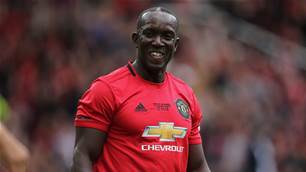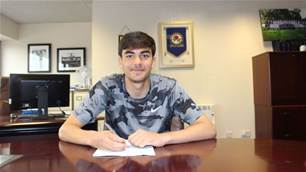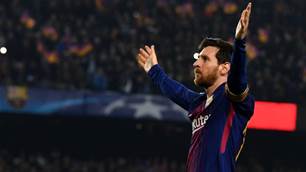When Samuel Eto’o decided he wanted to spill the beans on football, his life and Barcelona, FFT pulled up a chair…
Page 1 of 3 | Single page
Ronaldinho lives in a stunning hillside mansion with an infinity pool offering views over the Mediterranean to the south of Barcelona. His property is uncluttered, save for computer consoles.
Samuel Eto’o is very different. The Cameroonian lives in a relatively small apartment in the densely-populated residential district of Pedralbes with his wife, three children and extended family. The match ball from the 2006 Champions League Final jostles for space with a lifesize gold bust of Eto’o from Unicef, a child’s table football, three African Player of the Year trophies, a mock diamond-studded iPod nano, banks of football and film DVDs, piles of football magazines from around the globe, a picture of Eto’o with French president Jaques Chirac and a TV the size of Equatorial Guinea clad in what appears to be crocodile skin.
The lithe Eto’o emerges from a bedroom wearing an orange D&G vest and cream shorts. A woman screams in French on the TV. She is being strangled. Reality merges with art as Eto’o’s youngest cries in another room, while
a man snores in a corner seat.
The African art on the wall indicates that he’s still in touch with his roots. When he joined Barça in 2004, he announced: “I will run like a black man to live like a white man.” For millions of Africans he’s the Muhammad Ali of the 21st Century, with visits home to Cameroon taking on the pomp of a
state occasion. He’s more than a footballer, he’s the continent’s standard bearer.
If he hadn’t played the game, Eto’o says he’d be a lawyer. He has the intelligence and sincerity, if not the cautiousness. If Eto’o has something to say, he says it. His outspokenness gets him into trouble, and on occasions he can sound like Eric Cantona. But, when you’re the best number 9 in the world, people listen.
It is two days after Barça snatched a 3-3 draw against Real Madrid in the Nou Camp, a game in which Eto’o played just 45 minutes thanks to Oleguer’s sending off. Without Eto’o for five months this season, after he injured his knee against Werder Bremen in September, Barça have struggled to rise above mediocrity. No matter how much he disagrees, it’s no coincidence. Eto’o shapes Barça’s attack, providing space and runs for team-mates to make key passes. If Ronaldinho makes Barça dance, Eto’o, the killer, makes them fire, scoring vital goals.
“Sit down,” he says, pointing to a hefty beige sofa that matches the rest of the room, “let’s talk.”
We’ve been in other footballers’ houses and there’s no evidence of their profession. It’s not like that here...
[Pointing to DVDs] I don’t go out often. I devour football. I ask my brother to prepare hundreds of videos on precise aspects of Barça’s attacking game because I want to know everything my team-mates are thinking. It’s my unseen training. Off the pitch, I digest information and different aspects of my team-mates’ play. You can see patterns developing, you see that players often do the same thing: for example, Messi always wants the ball inside because he never goes outside, Giuly is the opposite.
I know where the players like to pass – I don’t just run anywhere. I anticipate, I don’t guess. I don’t know where the ball will go, but I know where it will go if you understand. I have a gift, but I cultivate it. I imagine where the ball will be and force myself to be where it is. Now and again the game dictates, but usually it’s the players.
You say you have an instinct for scoring. Is that innate?
I’ve always scored goals, but I’ve worked on timing. Work, work, work. You get results if you work. In training I demand to be put in difficult situations, to receive difficult balls. Scoring is only easy when the ball is in the net. I shoot a lot in training. Out of every 100 stones that you throw you never know which one will kill the bird.
My job is to score goals. Every time I feel I have a chance, I try it. If not, I pass. But the priority is to score. When I attack, I only have goal in my head. My universe is the goal with a keeper in it. That and the box.
You’re at home in the box?
Yes. I know that place. I don’t panic there. I’m cold-blooded. It is fundamental to be able to shove out of your mind the thousands of things that can pollute your spirit in that moment.
Do you have a technique?
I look at the goalkeeper. He might make a small mistake. When I get the ball I think ‘goal’. I already know that I am going to control it. Everything is about the goal. I position myself so that I score. And when I don’t have the ball I run after it.
Not many people know that when you were younger, you played as a midfielder or as number ‘10’, but not as a ‘9’...
The great forwards have never had my education. I know what it is to defend because I played several positions which demanded sacrifice for the team. I try never just to be the guy who scores goals. I want to fight up front, in the middle or at the back. He who fights for every ball is he who doesn’t have a number on his back.
I was frail when I was younger – that taught me to dodge people. Above all
I discovered that speed is essential in football, and it wasn’t only to escape the big guys who were running after me! Everyone in the family is like me – thin and straight-backed. It is only my mother who is an African mother: imposing, striking, beautiful. And she has had six children. When she is there you know she is there.
How important is it for you to have your family in Barcelona?
It is not as important for them to be in Barcelona as it is to feel the support from the family, no matter where they are. The continent is a mental state. I live in Europe, but I sleep in Africa. Every goal of mine is a celebration of there. Hopefully I’ll have time to do more things for the people in Africa when I’ve stopped playing.
What are your most African traits?
My happiness. My desire to play football. My enthusiasm to play football, but I’ve changed. In Africa I played for pleasure. In Europe I play to win.
What was your biggest fault as a kid?
My heading was weak so my coach painted white circles onto a grey wall. I had to touch them with my head. I didn’t realise why I was missing headers, but then I understood. I became more precise because I could evaluate the distance between me and the goal. I often remember this grey wall which has allowed me to score so many important goals. There are a lot of good headers of the ball, but they are not as precise.
What type of player were you as a kid?
A gifted player technically who was not afraid of anything. I always tried the
impossible with the ball. I only dribble when it’s necessary now. I’ve managed to get rid of the extra stuff, which is not easy for an African who adores everything that is beautiful about the game. On the other hand, when I play for the national team, I have a tendency to go back to my roots. The national team manager uses me in a different way to Barça, where I am at the point of the team. At Cameroon I play behind the main striker or beside him and I become Cameroonian again. Dribbling, trying a nutmeg and making passes.
Are you ever tempted to play that way in Barcelona?
No. It’s very simple at Barcelona. I don’t have a desire to organise a game like Xavi or Deco, or to dribble like Ronaldinho, who is a genius. My strength is to keep my position. I always try to play for the team, whichever team it is. I am disciplined and I get upset when the others aren’t.
You must have been even more upset when you were out injured this season. How tough was that?
It was very difficult. I don’t think anybody chooses when they get injured. I was playing well and Barça were doing well. Life was like a dream – then I was injured.
Samuel Eto’o is very different. The Cameroonian lives in a relatively small apartment in the densely-populated residential district of Pedralbes with his wife, three children and extended family. The match ball from the 2006 Champions League Final jostles for space with a lifesize gold bust of Eto’o from Unicef, a child’s table football, three African Player of the Year trophies, a mock diamond-studded iPod nano, banks of football and film DVDs, piles of football magazines from around the globe, a picture of Eto’o with French president Jaques Chirac and a TV the size of Equatorial Guinea clad in what appears to be crocodile skin.
The lithe Eto’o emerges from a bedroom wearing an orange D&G vest and cream shorts. A woman screams in French on the TV. She is being strangled. Reality merges with art as Eto’o’s youngest cries in another room, while
a man snores in a corner seat.
The African art on the wall indicates that he’s still in touch with his roots. When he joined Barça in 2004, he announced: “I will run like a black man to live like a white man.” For millions of Africans he’s the Muhammad Ali of the 21st Century, with visits home to Cameroon taking on the pomp of a
state occasion. He’s more than a footballer, he’s the continent’s standard bearer.
If he hadn’t played the game, Eto’o says he’d be a lawyer. He has the intelligence and sincerity, if not the cautiousness. If Eto’o has something to say, he says it. His outspokenness gets him into trouble, and on occasions he can sound like Eric Cantona. But, when you’re the best number 9 in the world, people listen.
It is two days after Barça snatched a 3-3 draw against Real Madrid in the Nou Camp, a game in which Eto’o played just 45 minutes thanks to Oleguer’s sending off. Without Eto’o for five months this season, after he injured his knee against Werder Bremen in September, Barça have struggled to rise above mediocrity. No matter how much he disagrees, it’s no coincidence. Eto’o shapes Barça’s attack, providing space and runs for team-mates to make key passes. If Ronaldinho makes Barça dance, Eto’o, the killer, makes them fire, scoring vital goals.
“Sit down,” he says, pointing to a hefty beige sofa that matches the rest of the room, “let’s talk.”
We’ve been in other footballers’ houses and there’s no evidence of their profession. It’s not like that here...
[Pointing to DVDs] I don’t go out often. I devour football. I ask my brother to prepare hundreds of videos on precise aspects of Barça’s attacking game because I want to know everything my team-mates are thinking. It’s my unseen training. Off the pitch, I digest information and different aspects of my team-mates’ play. You can see patterns developing, you see that players often do the same thing: for example, Messi always wants the ball inside because he never goes outside, Giuly is the opposite.
I know where the players like to pass – I don’t just run anywhere. I anticipate, I don’t guess. I don’t know where the ball will go, but I know where it will go if you understand. I have a gift, but I cultivate it. I imagine where the ball will be and force myself to be where it is. Now and again the game dictates, but usually it’s the players.
You say you have an instinct for scoring. Is that innate?
I’ve always scored goals, but I’ve worked on timing. Work, work, work. You get results if you work. In training I demand to be put in difficult situations, to receive difficult balls. Scoring is only easy when the ball is in the net. I shoot a lot in training. Out of every 100 stones that you throw you never know which one will kill the bird.
My job is to score goals. Every time I feel I have a chance, I try it. If not, I pass. But the priority is to score. When I attack, I only have goal in my head. My universe is the goal with a keeper in it. That and the box.
You’re at home in the box?
Yes. I know that place. I don’t panic there. I’m cold-blooded. It is fundamental to be able to shove out of your mind the thousands of things that can pollute your spirit in that moment.
Do you have a technique?
I look at the goalkeeper. He might make a small mistake. When I get the ball I think ‘goal’. I already know that I am going to control it. Everything is about the goal. I position myself so that I score. And when I don’t have the ball I run after it.
Not many people know that when you were younger, you played as a midfielder or as number ‘10’, but not as a ‘9’...
The great forwards have never had my education. I know what it is to defend because I played several positions which demanded sacrifice for the team. I try never just to be the guy who scores goals. I want to fight up front, in the middle or at the back. He who fights for every ball is he who doesn’t have a number on his back.
I was frail when I was younger – that taught me to dodge people. Above all
I discovered that speed is essential in football, and it wasn’t only to escape the big guys who were running after me! Everyone in the family is like me – thin and straight-backed. It is only my mother who is an African mother: imposing, striking, beautiful. And she has had six children. When she is there you know she is there.
How important is it for you to have your family in Barcelona?
It is not as important for them to be in Barcelona as it is to feel the support from the family, no matter where they are. The continent is a mental state. I live in Europe, but I sleep in Africa. Every goal of mine is a celebration of there. Hopefully I’ll have time to do more things for the people in Africa when I’ve stopped playing.
What are your most African traits?
My happiness. My desire to play football. My enthusiasm to play football, but I’ve changed. In Africa I played for pleasure. In Europe I play to win.
What was your biggest fault as a kid?
My heading was weak so my coach painted white circles onto a grey wall. I had to touch them with my head. I didn’t realise why I was missing headers, but then I understood. I became more precise because I could evaluate the distance between me and the goal. I often remember this grey wall which has allowed me to score so many important goals. There are a lot of good headers of the ball, but they are not as precise.
What type of player were you as a kid?
A gifted player technically who was not afraid of anything. I always tried the
impossible with the ball. I only dribble when it’s necessary now. I’ve managed to get rid of the extra stuff, which is not easy for an African who adores everything that is beautiful about the game. On the other hand, when I play for the national team, I have a tendency to go back to my roots. The national team manager uses me in a different way to Barça, where I am at the point of the team. At Cameroon I play behind the main striker or beside him and I become Cameroonian again. Dribbling, trying a nutmeg and making passes.
Are you ever tempted to play that way in Barcelona?
No. It’s very simple at Barcelona. I don’t have a desire to organise a game like Xavi or Deco, or to dribble like Ronaldinho, who is a genius. My strength is to keep my position. I always try to play for the team, whichever team it is. I am disciplined and I get upset when the others aren’t.
You must have been even more upset when you were out injured this season. How tough was that?
It was very difficult. I don’t think anybody chooses when they get injured. I was playing well and Barça were doing well. Life was like a dream – then I was injured.
Related Articles

A-League All Stars want Red Devils legend Yorke for Barcelona battle

Aussie former Barcelona starlet signs for Championship club













